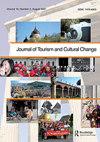重新记忆:关于在旅游背景下恢复下西里西亚(波兰)战后早期记忆
IF 2.5
4区 管理学
Q2 HOSPITALITY, LEISURE, SPORT & TOURISM
引用次数: 0
摘要
摘要1989年波兰政治制度的变化不仅彻底重塑了国家的政治和经济结构,还导致了地区和国家层面的一系列身份认同过程。从共产主义的负担中解放出来的记忆,要求重新定义身份和遗产等概念。有必要核实神话和半信半疑的真相,阐明迄今为止在公共空间和话语中被沉默、隐藏甚至抹去的问题。在这种背景下,所谓的“收复领土”,即第二次世界大战后成为波兰一部分的地区,似乎特别有趣。这篇文章关注的是有目的的和偶然的、草根的和制度性的行动,这些行动说明了人们广泛理解的下西里西亚“恢复记忆”的过程(1945年之前的尼德施莱森)。然而,分析的主题不仅是过程本身,而且主要是其旅游背景。本文试图确定这些行为是否以及如何影响该地区的旅游空间和现象。采用的方法有案例研究、观察和案头研究。本文章由计算机程序翻译,如有差异,请以英文原文为准。
Memory anew: about restoring early post-war remembrance in Lower Silesia (Poland) in tourism context
ABSTRACT The 1989 changes in the political system in Poland resulted not only in thorough reshaping of political and economic structure of the state, but also in a range of identity processes at both regional and country level. Memory, freed from the burden of communism, demanded concepts such as identity and heritage is defined again. It was necessary to verify myths and half-told truths, to articulate issues that had so far been silenced, hidden or even erased from the public space and discourse. In this context, the so-called ‘recovered territories’, namely the regions which became part of Poland after the Second World War, seem particularly interesting. The article focuses on both purposeful and accidental, grassroots and institutional actions which illustrate broadly understood processes of ‘restoring remembrance’ in Lower Silesia (Niederschlesien before 1945). The subject of the analysis, however, is not only the process itself but primarily its tourism context. The paper is trying to determine whether and how such actions influence tourist space and phenomena in the region. The methods used were case study, observation, and desk research.
求助全文
通过发布文献求助,成功后即可免费获取论文全文。
去求助
来源期刊

Journal of Tourism and Cultural Change
HOSPITALITY, LEISURE, SPORT & TOURISM-
CiteScore
5.10
自引率
9.10%
发文量
31
期刊介绍:
Journal of Tourism and Cultural Change ( JTCC ) is a peer-reviewed, transdisciplinary and transnational journal. It focuses on critically examining the relationships, tensions, representations, conflicts and possibilities that exist between tourism/travel and culture/cultures in an increasingly complex global context. JTCC provides a forum for debate against the backdrop of local, regional, national and transnational understandings of identity and difference. Economic restructuring, recognitions of the cultural dimension of biodiversity and sustainable development, contests regarding the positive and negative impact of patterns of tourist behaviour on cultural diversity, and transcultural strivings - all provide an important focus for JTCC . Global capitalism, in its myriad forms engages with multiple ''ways of being'', generating new relationships, re-evaluating existing, and challenging ways of knowing and being. Tourists and the tourism industry continue to find inventive ways to commodify, transform, present/re-present and consume material culture. JTCC seeks to widen and deepen understandings of such changing relationships and stimulate critical debate by: -Adopting a multidisciplinary approach -Encouraging deep and critical approaches to policy and practice -Embracing an inclusive definition of culture -Focusing on the concept, processes and meanings of change -Encouraging trans-national/transcultural perspectives
 求助内容:
求助内容: 应助结果提醒方式:
应助结果提醒方式:


